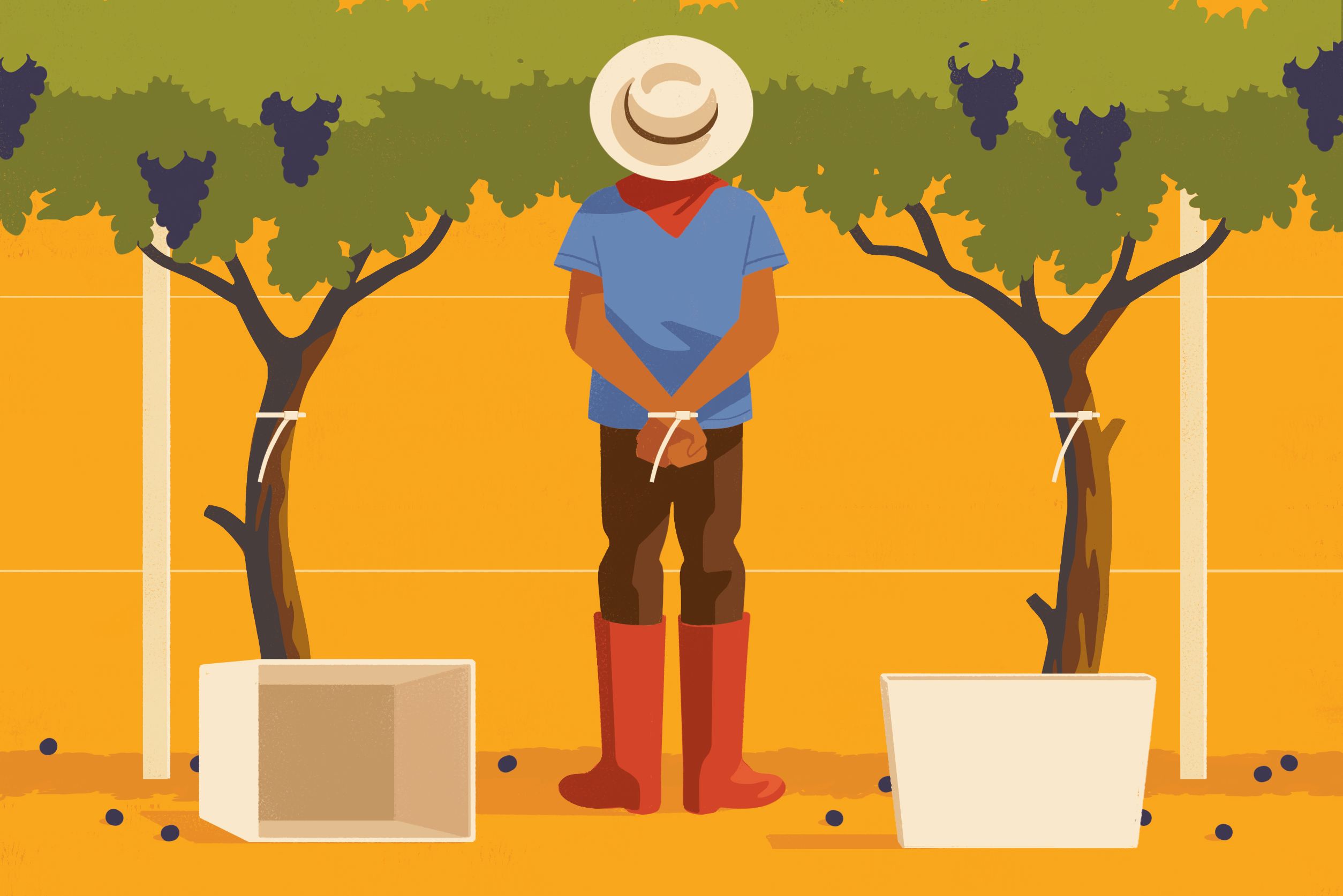‘A Brick Wall of Justice’
For days, Portlanders have been marching through the streets of downtown, demanding radical changes to the criminal justice system and policing practices, in the wake of George Floyd's murder on May 25 when he was pinned down by a Minnesota police officer.
The images of protesters staging a die-in or kneeling with their hands up on the Morrison Bridge are powerful, showing a mass effort with one goal: change, at any cost.
But this moment—a call for a collective cultural shift, yes—is also personal. Inside the protest, you’ll find people who have marched during the civil rights movement, people who are attending their first protest, people rediscovering their racial identity, people who are skipping school or work, people who are traveling in from Tillamook or Corvallis, people who want to be part of this movement, people who are tired of watching police brutality.
Portland Monthly attended the protest Wednesday night and asked a few protesters the same questions: why are you here, and what does it mean to you to be a part of this movement?
Note: Many of the protesters asked that they be identified by only an initial or a first name, or that we exclude their name altogether, to avoid police retaliation.
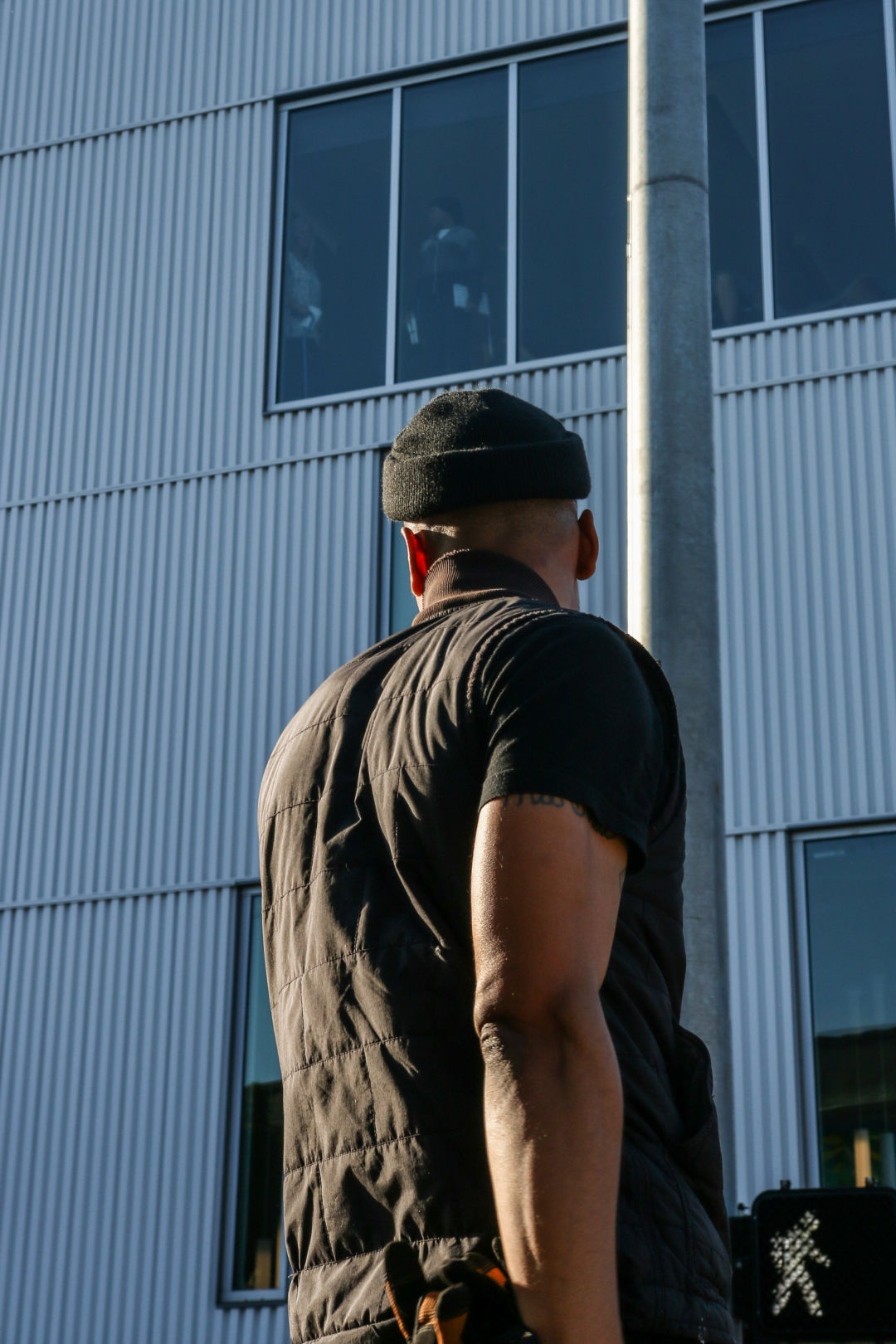
An organizer for the current Black Lives Matter protest in Portland
Image: Gabriel Granillo
An Organizer
“Instead of changing their policies to maybe appease what we’re trying to have go on here tonight, [Portland Police Bureau] seems to have doubled down. What I’m seeing countrywide is cops brutalizing people. There’s no justification whatsoever.... We’re not going to stand for this. I saw cops laughing at victims that didn’t have their insulin. Until they wisen up and get a little more serious, I think we need to keep marching and keep disrupting. I’m not very happy with the way [police] have been taking this, but we’re playing the long game on this one. I am here for the long run.
“We are marching today to the beat of our own drum, to the sound of our own narrative. Our spirits, our hearts, our minds, together as one. We are strong. When the cops try to break us up, they’re going to run into an unmovable force. We are a brick wall of justice, motherfucker. Guarantee that.”
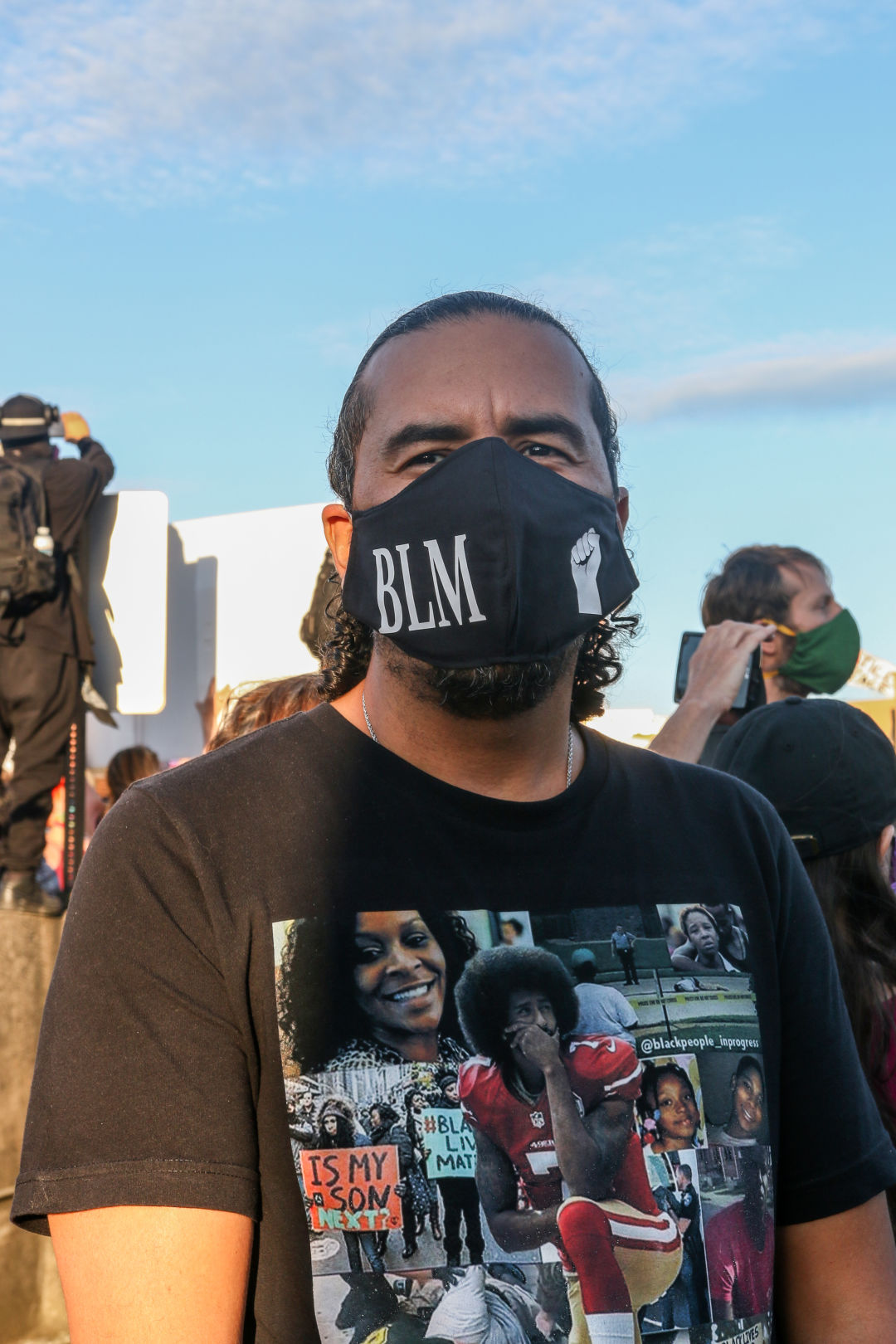
“They call me B.”
Image: Gabriel Granillo
B.
“I was always the one that sat on the couch and watched [protests] on TV, saying, like, ‘Man, they crazy,’ until I came down the first night and experienced it for the first time. I just love the energy, man. I just want to be a part of something that’s going to be a part of history. I want to look back when I’m 60, 70 years old and say, ‘I was a part of that.’ I’ve never felt nothing like this ever in my life, never seen anything like this ever in my life. And I’m just really proud of my city. I just love it, man.
“I just want all of my white friends and every white person, if they see something going on, just speak up. That’s all we want you guys to do. That’s it. I just love the feeling, man. The thing is, I’m not really a crier, man. But the first couple nights, just looking at this, it just brings tears to your eyes. It’s just amazing. I just love my city for this.
“We just need to move all these old people out the way, man, and just let the future take over, and that’s the problem—they don’t want to let us take over. They just so stuck in their old ways. It’s like they’re comfortable living in their big houses and just looking at us. They’re like humans, and we’re like ants. They’re just stepping on us all the time. We’re just fucking fed up, man, that’s all. It’s just like, this shit has been happening for years and years. And I think the George Floyd incident, it was the drop of water that overflowed it. And we’re just not going to give up. Even though [the Minnesota police officers involved in Floyd’s death] got arrested, we need conviction, and then, after that, what’s next? We need to get people in office to change everything. There’s no way we’re going to go back to the old ways.
“Just like with the COVID situation, we’re witnessing the change of the world. I don’t think this has ever happened in Portland, ever.... I wake up every morning and I’m looking at my clock like, ‘Is it six o’clock yet?’ Because I want to get out here. They look at it, and they’re like, 'Man, there’s so many people.’ But what do you expect? There’s no school. No one’s working. We ain't got shit else to do. So why not do this and make a change?”
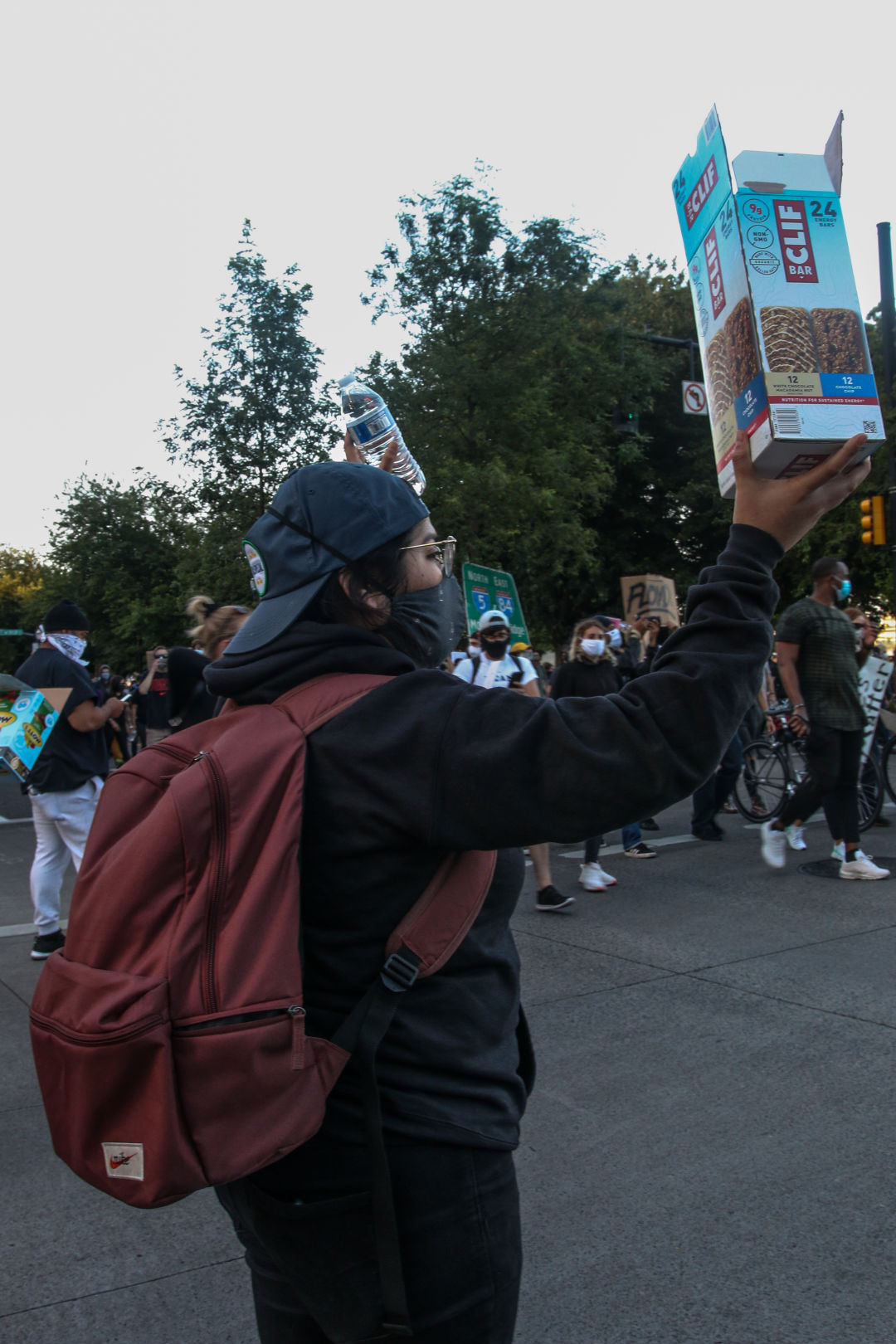
“This is my first time handing out snacks. It feels good to be out here.”
Image: Gabriel Granillo
Gabriella
“I think this movement has a lot to do with recognizing privilege. Personally, as a Latina woman, I’m pretty fair-skinned, so the past few years has been recognizing what my privilege is, even though I’m Latina, with the kind of history this country has. But this movement, to me, represents a group of people that have been oppressed for so long, and saying ‘no more’ to it, especially when it comes to police brutality.
“Yes, all the cops involved in George Floyd’s death are getting charged, but it shouldn’t have to come to the point where it’s put across all platforms of social media and news stations. We shouldn’t have to hold the cops accountable.
“I’m actually finishing up school, so I had a huge final paper that I needed to write that was due today, and it’s made me feel really complacent not having been able to be a part of it as much as I want to be. Yes, there’s the argument of ‘You don’t have to go because there are so many already participating,’ but that’s not the point, right? It’s to show your support, whether it’s amongst just your community, your friends. Maybe your family isn’t as accepting or your social groups don’t agree, and your presence kind of forces them to acknowledge that this is something that is happening that you can’t ignore.”
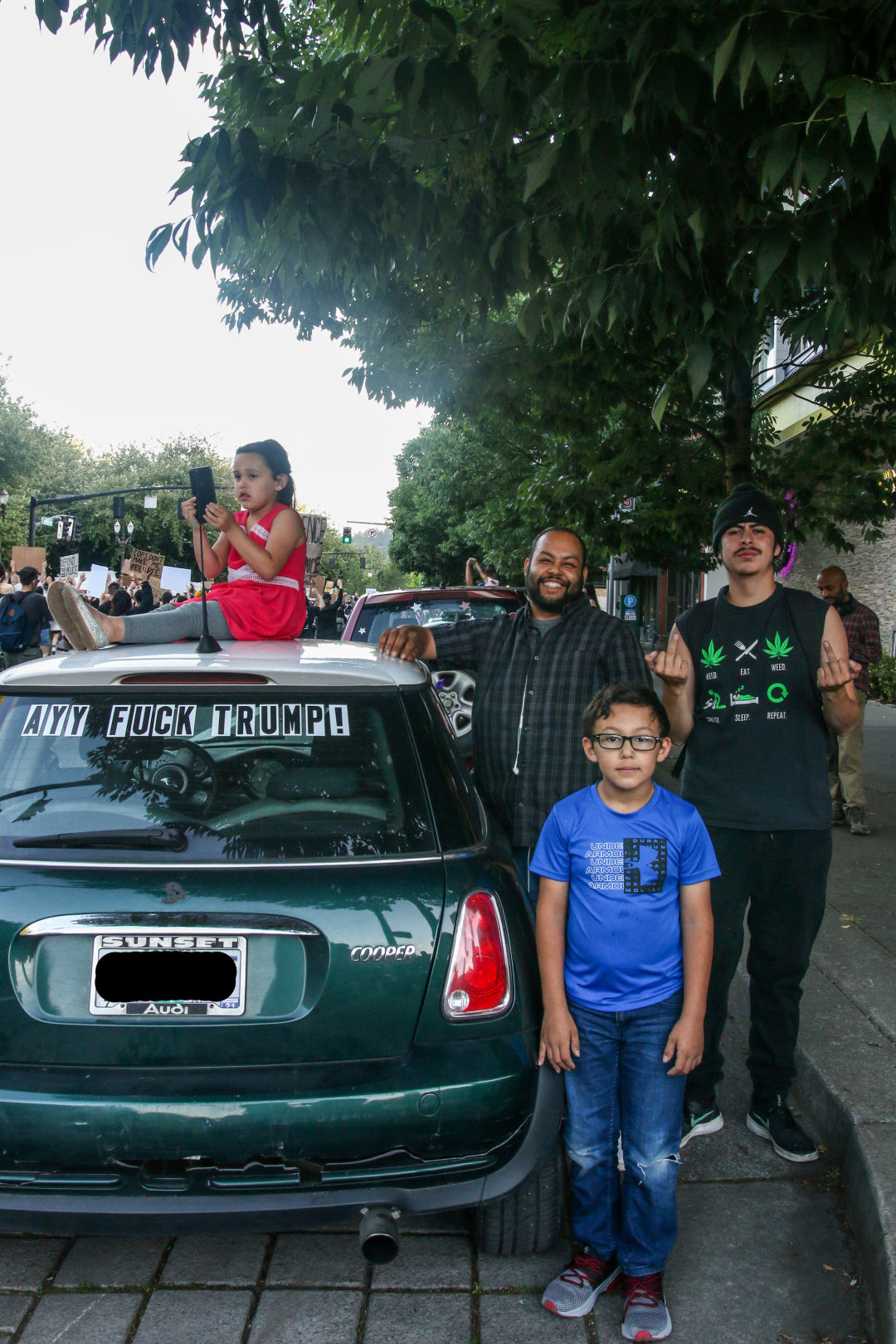
Michael (right) and his family.
Image: Gabriel Granillo
Michael
“It means a lot to be out here. Everybody has their own rights, but, come on now. Yeah, white people have their own privilege, and yeah, the cops can be fucking dicks. How I think about it: It's fucked up. That man [George Floyd] shouldn’t have died like that, you know. He wasn’t doing nothing. And it’s not even just because of [Floyd], it’s just in general. There’s been multiple deaths by cops, and it’s mainly African Americans.
“I’m Mexican, and I’m proud, you know. I wouldn’t like it if nobody did nothing to an officer if they killed one of my family members.”
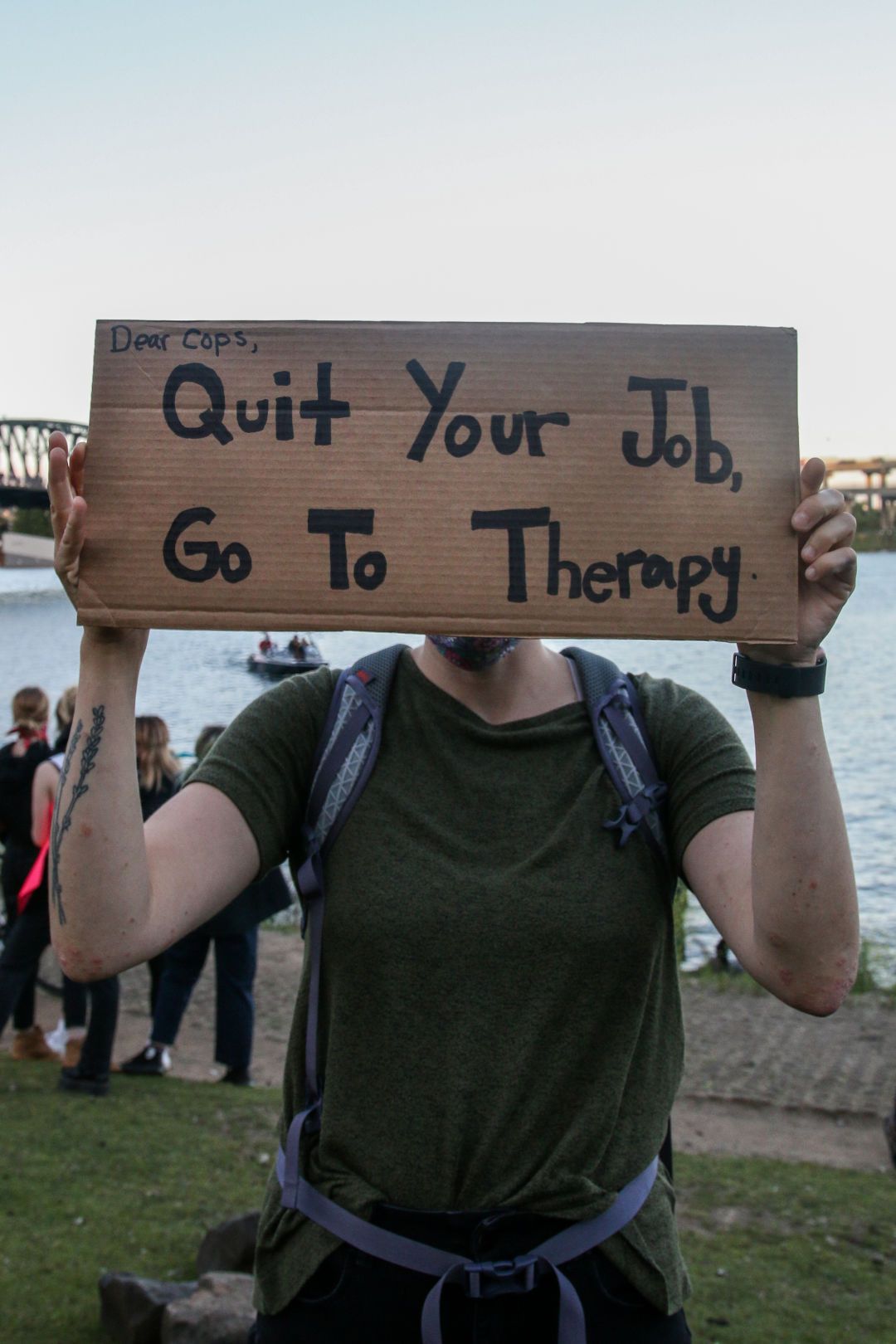
"I tell all the media people that they should talk to people of color, but I'm assuming you've already done that."
Image: Gabriel Granillo
Juju
“I just feel like it’s finally time to not just say ‘Black Lives Matter’ or, you know, just this bullshit whitewashing surface-level stuff, and I’m just trying to put my money where my mouth is and donate a ton of money, and redistribute the wealth and be here.
“I just moved to Portland in October, and I only know my sister, but she’s not even here, so I’m pretty much alone, which is pretty wild. But I feel like this has been this huge sense of community and mutual aid and love for this cause that we’re doing together. [COVID-19] makes it even a bit more somber and serious that everyone is like, “Yeah, we’re done with this social distancing thing and we have to be together,’ and we’re choosing to save black lives.”
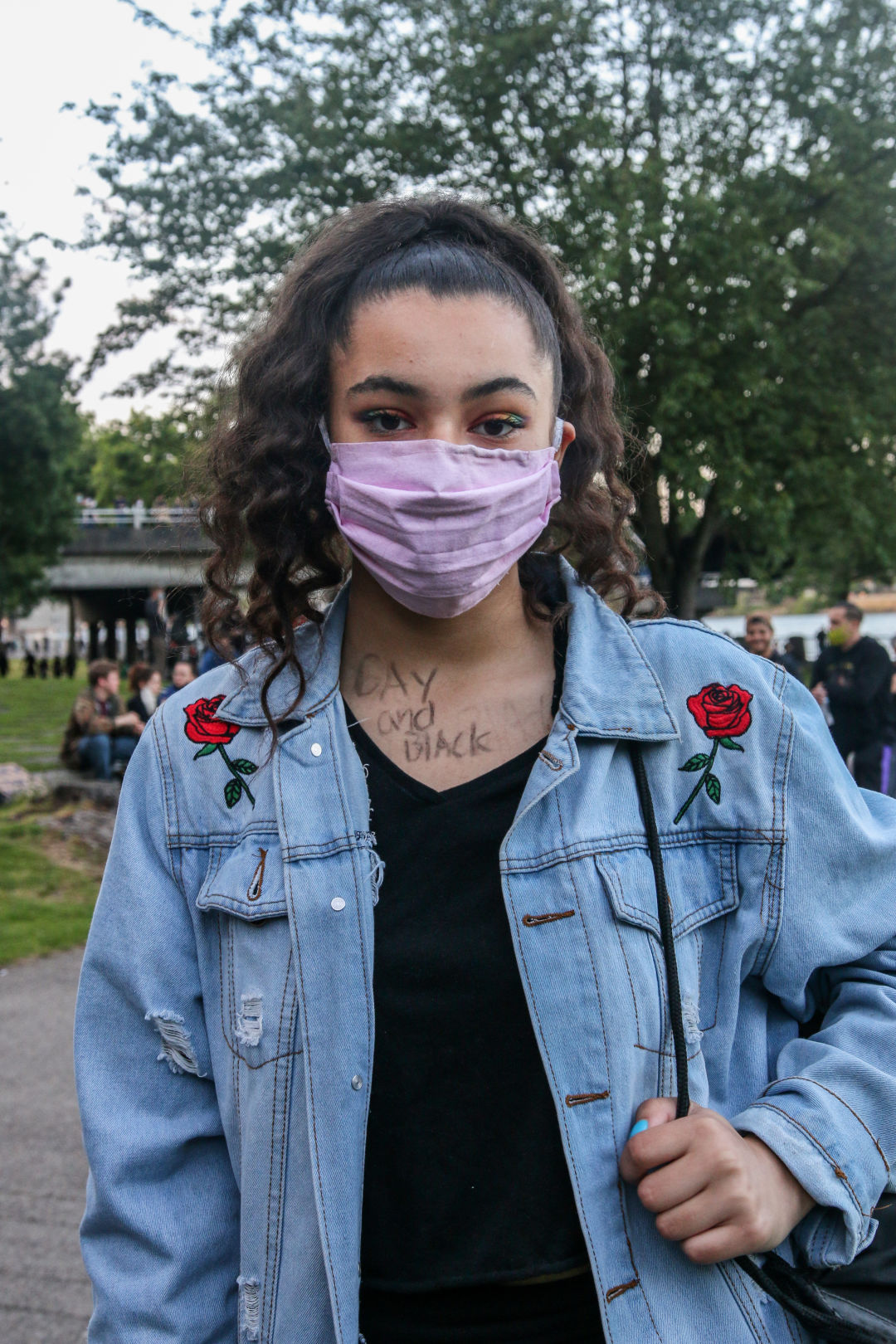
“T-A-Y.”
Image: Gabriel Granillo
Tay
“I’m here because I’m 16 and I really believe in BLM, and I think what’s going on is really wrong.
“I mean, this is something that I’ve been fighting for for a long time. It’s something that I believe in. It’s something that I want to take with me to my future as far as going into law, so that I can help defend people like this.
“To me, it just really means being able to be safe in my own city and know that all my friends of color are also safe.”
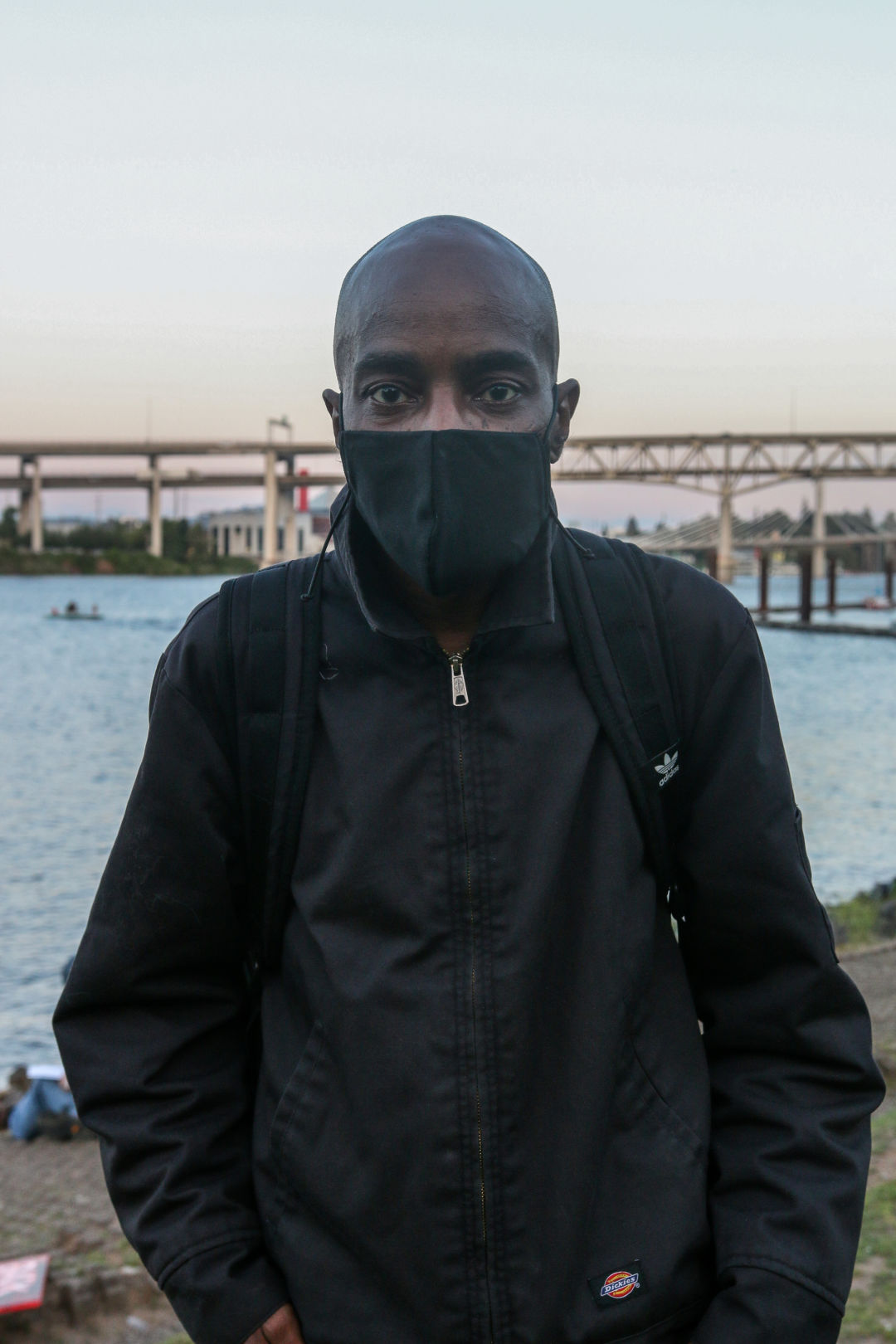
“I think this is great for waking people up so they could see what the government is really about.”
Image: Gabriel Granillo
Jeffery
“Well, I’m a lot older, so I remember going to the Martin Luther King riots in Detroit, so I’ve always been into activism. I think it started off with the case of police killing a young man, but because of the police action, it’s turned into a fight against fascism and white supremacy.
“There has to be a change in this whole system. If they don’t, man, black people are going to become extinct in this country, for real. They’re definitely trying to get rid of us. For us, 400 years, man, that’s it. We can’t wait no more.
“See, a lot of people don’t realize that the Civil Rights Act was passed because of the riots. I don’t believe in violence, but I believe in aggressive civil disobedience. I think this is great for waking people up, but I think the short-term goal should be a general strike.
“I’m hoping that white America finally takes responsibility. That’s the no. 1 thing. They have to take responsibility. They have to change this. Black people should be sitting at home while they out here fighting, I feel.”
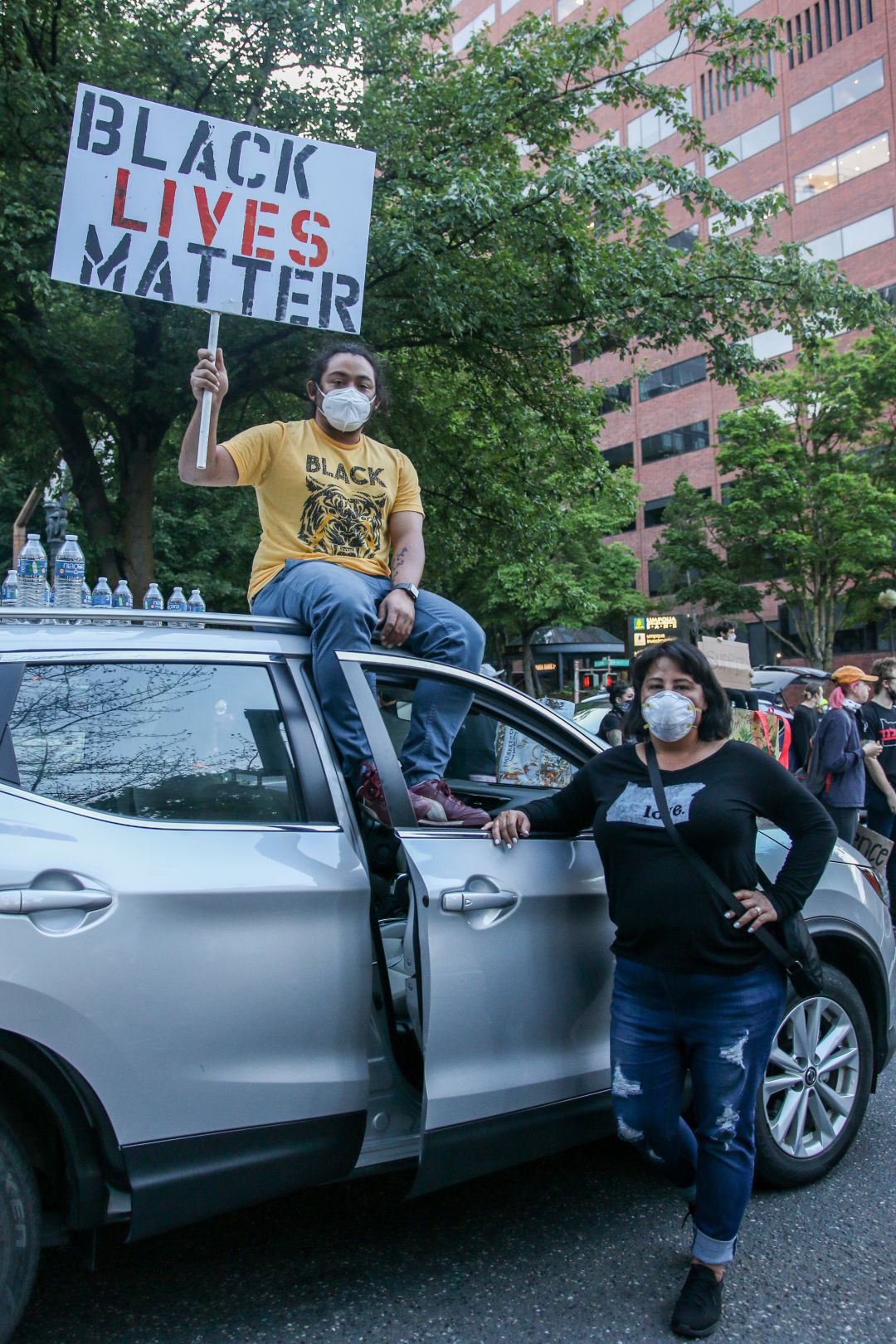
“Do you want a peanut butter and jelly sandwich or some water?”
Image: Gabriel Granillo
Corina & Alex
Corina: “I grew up in the barrio in San Francisco, and so I have direct experience with police brutality and how marginalized communities are treated. I just felt like I couldn’t stay home and not do anything. I’ve risked COVID-19 to come out and show support, and I’ll be writing to the governor and state legislators about trying to enact some reform, because right now, with the movement, we’re gaining attention, but what’s next?
“It’s systemic inequality that permeates everything, right? From social justice to how people are sentenced, who’s prosecuted and who’s not. And because I worked my way out of that environment.... I see a very different world, but I’ve also seen the inequality in how people are treated depending on their ethnicity, their background, and the benefit of the doubt that’s given to one person over another. So it’s a really personal issue for me to be out here.
Alex: “I’ve been passive for too long about this. I’m surrounded by people who are like-minded who view racism as bad, but I just can’t keep sitting around. It’s not doing a service to myself. It’s not doing a service to my community.
“I don’t know what snapped, it just did. I think it’s just being passive for too long and then seeing the outrageous police violence that happened in Minneapolis. I’ve been frustrated and annoyed for a long time about this, so it’s just the perfect storm, I guess.
“I feel a lot more connected to being brown now. I grew up in Kentucky. I went to middle school and high school in Kentucky, and I felt like I really had to hide my color. I’m a freshman in college and now I’m finally embracing that I’m brown, and I’m not going to be silenced anymore.
“The current police system needs to be abolished. It is a system founded in racism, founded in slavery. It is a system that isn’t broken, but is designed to oppress and needs to be replaced. We’re not going to fix it with new training. We’re going to fix it by replacing what we have now.”



